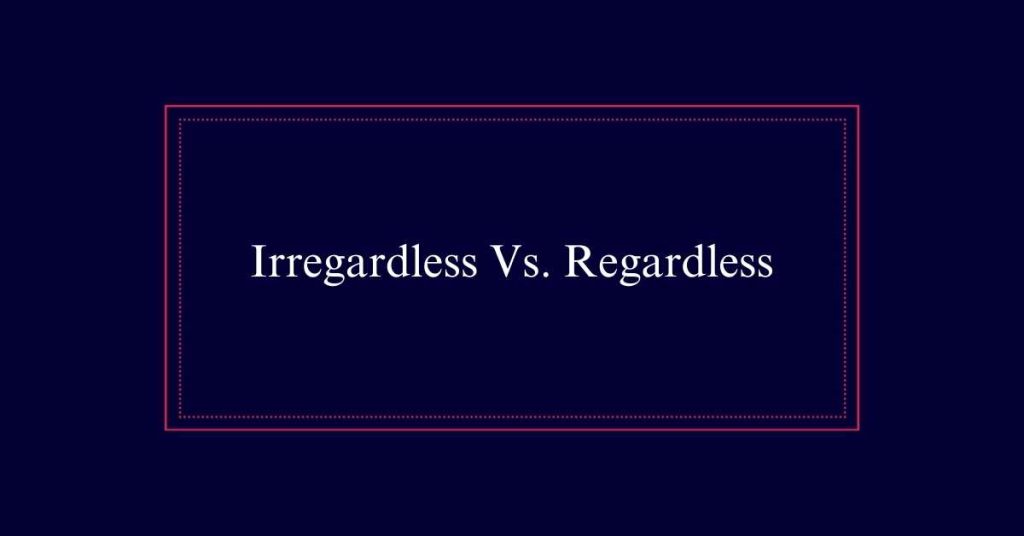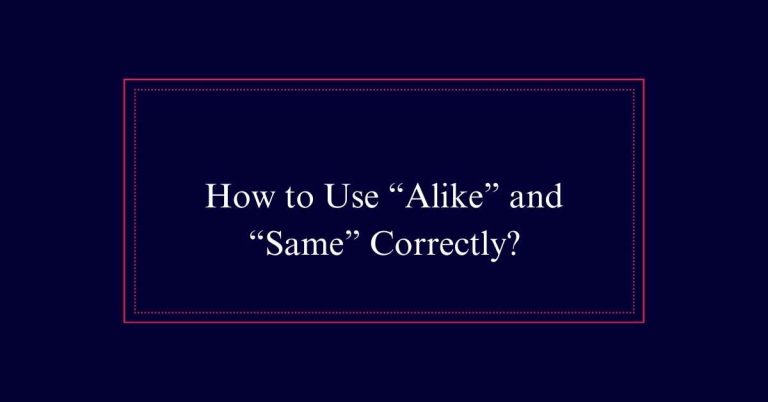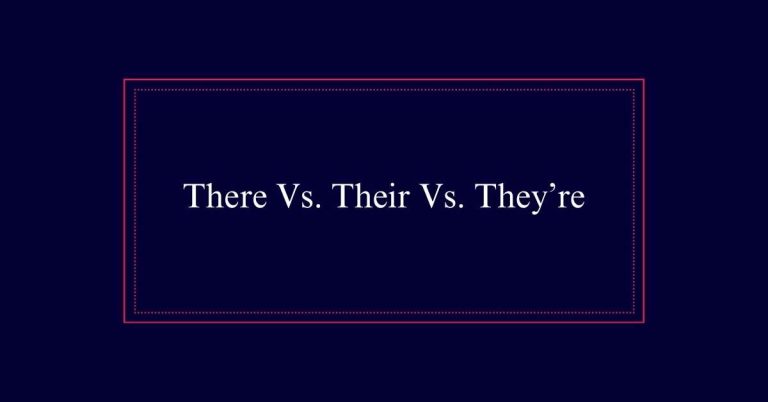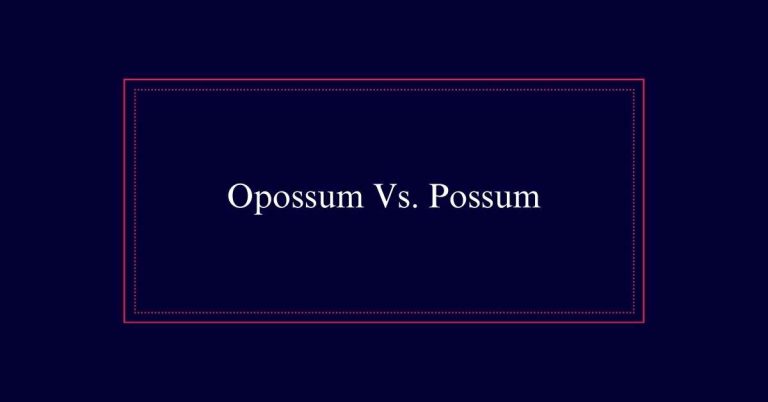Irregardless Vs. Regardless
‘Regardless’ is a correct adverb meaning “without regard” or “despite everything.” It first appeared in the 16th century and is well-accepted in both formal and informal contexts. ‘Irregardless,’ on the other hand, emerged in the 20th century and combines ‘regardless’ with the prefix ‘ir-‘, creating a double negative.
Although often used in informal speech, ‘irregardless’ is considered nonstandard and is not suitable for formal writing. Despite being recognized by some dictionaries, it is labeled incorrect. To maintain professionalism, you should use ‘regardless’ in your communications.
Definitions of Both Words
Both ‘regardless’ and ‘irregardless’ mean despite everything or without being affected by something. They function primarily as adverbs in sentences.
‘Regardless’ is derived from the root word ‘regard,’ meaning to contemplate or take into account, and the suffix ‘less,’ which means without. This creates a clear, logical construction indicating a lack of contemplation for certain factors.
‘Irregardless,’ on the other hand, combines ‘regardless’ with the prefix ‘ir-,’ leading to a double negative. Despite its unconventional structure, ‘irregardless’ is recognized in many dictionaries as a valid word, though it is often labeled as nonstandard.
In formal writing, ‘regardless’ is preferred due to its straightforward construction and accepted usage. Both words, however, effectively convey the same meaning.
Historical Background
The historical background of ‘regardless’ and ‘irregardless’ reveals the evolution and acceptance of these terms in the English language. ‘Regardless’ has been a part of English since the 16th century, consistently used to mean ‘without regard’ or ‘despite.’
The term ‘irregardless’ surfaced in the early 20th century, first appearing in print around 1912. Despite its nonstandard status, ‘irregardless’ gained traction, being included in Merriam-Webster’s unabridged edition in 1934. Linguists suggest it may be a blend of ‘irrespective’ and ‘regardless.’

Over the years, ‘irregardless’ has been used in spoken language, though it remains controversial among grammarians. While ‘regardless’ is universally accepted, ‘irregardless’ persists in usage, reflecting the fluid nature of language.
Morphological Breakdown
Morphologically, ‘regardless’ and ‘irregardless’ can be dissected to understand their construction and implications. ‘Regardless’ consists of the root word ‘regard,’ meaning to contemplate, and the suffix ‘less,’ which means without. Hence, ‘regardless’ translates to ‘without regard.’
On the other hand, ‘irregardless’ adds the prefix ‘ir-‘ to ‘regardless,’ creating a seemingly redundant double negative. This prefix usually negates the word it precedes, leading to confusion.
Here’s a breakdown:
- Regard: Root word, meaning to contemplate.
- Less: Suffix, indicating without.
- Ir-: Prefix, intended to negate but resulting in redundancy.
Dictionary Recognition
Despite its unusual construction, ‘irregardless’ has gained recognition in many dictionaries. Merriam-Webster included it in their unabridged edition in 1934. It is also found in other reputable dictionaries today. While ‘irregardless’ is typically labeled as nonstandard, it is acknowledged as a valid word.
This is because language evolves over time, and usage determines recognition. Dictionaries aim to document language as it is used, not just how it should be used. As a result, words like ‘irregardless’ find their place, reflecting shifts in communication. However, many experts still advise using ‘regardless’ in formal writing due to its clearer construction and acceptance.
Usage in Modern Language
In modern language, ‘irregardless’ continues to be used by many speakers despite its nonstandard status. It remains a topic of debate among language enthusiasts and professionals. Here are three points to take into account:
- Prevalence: ‘Irregardless’ appears frequently in spoken and informal written communication.
- Recognition: While many dictionaries list ‘irregardless’ as a word, they often label it nonstandard.
- Effectiveness: Despite its controversial construction, ‘irregardless’ conveys a clear meaning similar to ‘regardless.’
Formal Vs. Informal Contexts
Both ‘regardless’ and ‘irregardless’ can be used in various contexts, but their appropriateness differs between formal and informal settings. ‘Regardless’ is widely accepted in both formal and informal contexts due to its standard construction. In contrast, ‘irregardless’ is often viewed as nonstandard and is best reserved for informal settings where casual language is acceptable.
| Context | ‘Regardless’ | ‘Irregardless’ |
|---|---|---|
| Formal | Acceptable | Not recommended |
| Informal | Acceptable | Acceptable, but casual |
| Academic | Preferred | Avoid |
Common Sentences
Many sentences demonstrate the use of ‘regardless’ and ‘irregardless’ effectively. Here are a few examples to illustrate their application:
- Regardless:
- ‘She continued her studies regardless of the obstacles.’
- ‘They went for a hike regardless of the weather forecast.’
- ‘The policy applies regardless of age or gender.’
- Irregardless:
- Irregardless of the warnings, they proceeded with the plan.
- ‘He spoke his mind irregardless of the potential backlash.’
- ‘She wore the dress irregardless of the event’s dress code.’
These sentences showcase how both words function similarly as adverbs, conveying determination or indifference to external factors.
While ‘regardless’ is preferred in formal writing, ‘irregardless’ often appears in casual speech.
Public Perception
While examples of ‘regardless’ and ‘irregardless’ illustrate their use, public perception reveals a striking preference for one over the other. ‘Regardless’ is widely accepted and used in both formal and informal contexts without hesitation.
In contrast, ‘irregardless’ often faces criticism and is labeled as nonstandard. Many people view ‘irregardless’ as incorrect due to its redundant prefix ‘ir-.’ This perception leads to its limited use, mostly in informal speech or writing. Some speakers and writers avoid ‘irregardless’ entirely to prevent negative reactions.
Language Evolution
Language evolves over time, adapting to the changing needs and habits of its speakers. The emergence of words like ‘irregardless’ reflects this evolution. Although ‘irregardless’ is often frowned upon, it has gained recognition in many dictionaries. This acceptance highlights how language changes.
Consider these points:
- Historical Acceptance:
‘Irregardless’ has been documented since 1934, showing long-term use.
- Communication Efficiency:
Despite its nonstandard status, ‘irregardless’ effectively conveys meaning.
- Cultural Influence:
Popular media and everyday speech contribute to the adoption of new words.
Expert Recommendations
Experts generally advise using ‘regardless’ instead of ‘irregardless’ in formal writing to maintain standard language conventions. This recommendation is based on the fact that ‘regardless’ is universally accepted and recognized as correct in both formal and informal contexts.
Irregardless,’ although recognized by dictionaries, is considered nonstandard due to its redundant construction. Using ‘irregardless’ can distract readers or lead to perceptions of less polished writing. To guarantee clarity and avoid potential criticism, it is best to use ‘regardless.’
This aligns with traditional language rules and meets the expectations of a wider audience. Adhering to this advice enhances the professionalism and readability of your writing.






